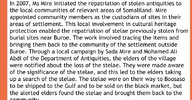Why isn't the Somali community given any credit for their courageous and honorable actions in defending Islam and the Prophet's grave from the Portuguese?
You are using an out of date browser. It may not display this or other websites correctly.
You should upgrade or use an alternative browser.
You should upgrade or use an alternative browser.
A renown Saudi Arabian historian claims Somalis defended the Prophet Mohammad's (PBUH) grave from the Portuguese.
- Thread starter HabarSteven12
- Start date
A Somali sister explains the video indepth below.
Dalac Bilaash
☠ Emperor of The Horn ☠
Stop self glazing yourself the number one rule Somalis need to learn
This Ethiopian imposter has master Somali cajiibPeople still think you are Ethiopian watch out


Weren't you insisting somalis had nothing to do with it?Why isn't the Somali community given any credit for their courageous and honorable actions in defending Islam and the Prophet's grave from the Portuguese?
The amount of outrageous and intellectually dishonest statements you are spewing is hilarious. Somalis didn't protect the prophet's grave or inflict heavy loss on the Portuguese. What are you smoking?
This is news to me, it seems we Somalis do not write anything down and wait for ajanabis to tell us stories... our OWN stories smh
Oral Tradition my futo. They should have picked up a pen and paper.
Oral Tradition my futo. They should have picked up a pen and paper.
mr.overeasy
The most eggcelent member
We almost certainly did some writing but our schooling, and therefore our historical recordings, were ruined as is the tradition of european colonizers.This is news to me, it seems we Somalis do not write anything down and wait for ajanabis to tell us stories... our OWN stories smh
Oral Tradition my futo. They should have picked up a pen and paper.
You can't colonize someone if you don't teach them a new history that makes them subservient.
The Arab historian was referring to the Adalites, and the Adal empire was a multi-ethnic Muslim state. The Arab historian assumed Somalis contributed to or played a substantial role in defending the prophet's grave based on where Adal was geographically situated. But the ethnic composition of the Adal Empire consisted of Somalis, Afars, Harlas, and many other groups. The ruling class of Adal primarily consisted of semitic-speaking sedentary groups like the Harla people.Weren't you insisting somalis had nothing to do with it?
We do not know the extent of support the Adalites offered in defending the prophet's grave from the Portuguese. They probably imposed a naval and trade blockage on the Portuguese. They probably harassed and attacked Portuguese ships sailing through the strategic trading centers situated in the Red Sea. There isn't much research or credible academic articles on this topic.
A joint group that consisted of Arabs, Ottomans, and Adalites confronted the Portuguese attempt to seize control of the prophet's grave. There were also many attempts in the past to seize control of the prophet's grave, and the Arabs defeated them without foreign support.
To conclude, the Arab historian was referring to the Adalites when Afonso de Albuquerque attempted to seize control of the prophet's grave. The Adal Empire was a multi-ethnic Muslim state, and we don't know exactly which ethnic group contributed to defending the prophet's grave. The ruling elite of Adal were semitic-speaking sedentary agriculturalists.
Knew you would've said that.The Arab historian was referring to the Adalites, and the Adal empire was a multi-ethnic Muslim state. The Arab historian assumed Somalis contributed to or played a substantial role in defending the prophet's grave based on where Adal was geographically situated. But the ethnic composition of the Adal Empire consisted of Somalis, Afars, Harlas, and many other groups. The ruling class of Adal primarily consisted of semitic-speaking sedentary groups like the Harla people.
We do not know the extent of support the Adalites offered in defending the prophet's grave from the Portuguese. They probably imposed a naval and trade blockage on the Portuguese. They probably harassed and attacked Portuguese ships sailing through the strategic trading centers situated in the Red Sea. There isn't much research or credible academic articles on this topic.
A joint group that consisted of Arabs, Ottomans, and Adalites confronted the Portuguese attempt to seize control of the prophet's grave. There were also many attempts in the past to seize control of the prophet's grave, and the Arabs defeated them without foreign support.
To conclude, the Arab historian was referring to the Adalites when Afonso de Albuquerque attempted to seize control of the prophet's grave. The Adal Empire was a multi-ethnic Muslim state, and we don't know exactly which ethnic group contributed to defending the prophet's grave. The ruling elite of Adal were semitic-speaking sedentary agriculturalists.
Have you not seen his takes?People still think you are Ethiopian watch out
Fr this guy reminds me of the black dude who was christian one day and muslim the otherWeren't you insisting somalis had nothing to do with it?
IKHALIIL
WW3 ENJOYER
The Arab historian was referring to the Adalites, and the Adal empire was a multi-ethnic Muslim state. The Arab historian assumed Somalis contributed to or played a substantial role in defending the prophet's grave based on where Adal was geographically situated. But the ethnic composition of the Adal Empire consisted of Somalis, Afars, Harlas, and many other groups. The ruling class of Adal primarily consisted of semitic-speaking sedentary groups like the Harla people.
We do not know the extent of support the Adalites offered in defending the prophet's grave from the Portuguese. They probably imposed a naval and trade blockage on the Portuguese. They probably harassed and attacked Portuguese ships sailing through the strategic trading centers situated in the Red Sea. There isn't much research or credible academic articles on this topic.
A joint group that consisted of Arabs, Ottomans, and Adalites confronted the Portuguese attempt to seize control of the prophet's grave. There were also many attempts in the past to seize control of the prophet's grave, and the Arabs defeated them without foreign support.
To conclude, the Arab historian was referring to the Adalites when Afonso de Albuquerque attempted to seize control of the prophet's grave. The Adal Empire was a multi-ethnic Muslim state, and we don't know exactly which ethnic group contributed to defending the prophet's grave. The ruling elite of Adal were semitic-speaking sedentary agriculturalists.

Gacmeey
Madaxweynaha Qurbo Joogta 🇸🇴
The Arab historian was referring to the Adalites, and the Adal empire was a multi-ethnic Muslim state. The Arab historian assumed Somalis contributed to or played a substantial role in defending the prophet's grave based on where Adal was geographically situated. But the ethnic composition of the Adal Empire consisted of Somalis, Afars, Harlas, and many other groups. The ruling class of Adal primarily consisted of semitic-speaking sedentary groups like the Harla people.
We do not know the extent of support the Adalites offered in defending the prophet's grave from the Portuguese. They probably imposed a naval and trade blockage on the Portuguese. They probably harassed and attacked Portuguese ships sailing through the strategic trading centers situated in the Red Sea. There isn't much research or credible academic articles on this topic.
A joint group that consisted of Arabs, Ottomans, and Adalites confronted the Portuguese attempt to seize control of the prophet's grave. There were also many attempts in the past to seize control of the prophet's grave, and the Arabs defeated them without foreign support.
To conclude, the Arab historian was referring to the Adalites when Afonso de Albuquerque attempted to seize control of the prophet's grave. The Adal Empire was a multi-ethnic Muslim state, and we don't know exactly which ethnic group contributed to defending the prophet's grave. The ruling elite of Adal were semitic-speaking sedentary agriculturalists.

Weren't you insisting somalis had nothing to do with it?

I have I’m informing him that whatever he does he’s practically a foreigner on this forumHave you not seen his takes?
Somalis do write things down although there’s barely archeology in Somalia, there’s been stelae’s found im not sure where they are now thoThis is news to me, it seems we Somalis do not write anything down and wait for ajanabis to tell us stories... our OWN stories smh
Oral Tradition my futo. They should have picked up a pen and paper.
Attachments
Latest posts
-
Chinese men expose Kenyans as thieves online (but Somalis are causing issues right?)
- Latest: Ghengis Kaarhis
-
Eating Food With Washed Hands Is Nasty But This Is Okay According To Wignats!
- Latest: Khal Mah Oma
-

